By Bradley Hughes
This past November I was honored—and a little daunted—to have wonderful colleagues invite me to write a retrospective about this blog. Honored because as the editor of the blog from 2009 until 2019, I have loved what this blog does for its authors and readers, for the field of writing center studies, and for the UW–Madison Writing Center. Daunted because I knew it would be a lot of work and impossible to do justice to the richness of 300 posts. I always tease—usually when a friend or I enter a new decade of our lives and worry about an unwelcome and undeniable sign of advancing age—that some numbers seem significant only because we happen to have a base-10 number system, no doubt because humans happen to have 10 fingers. But given how quickly most blogs go extinct—usually after just one or two or three posts—publishing 300 posts over 13 years (and counting) really deserves celebrating.
A Reading Marathon
To prepare to write these reflections, I spent a good chunk of January doing something that I bet not a single one of the other eight billion people on this planet was doing. I reread every one of the 299 posts and the well over 2000 comments on the Writing Center’s blog, from its sporadic start in the fall of 2009 through years when 25-30 very substantial (read, long) posts were published in a single year to the smart, important recent ones published in 2021 and 2022. In typically compulsive-Brad fashion, I filled a 300-row, 18-column spreadsheet about the Another Word opus, including a detailed summary and a classification system of topics for each post. All right, no comments about the sad state of Brad’s January 2022 that made all that reading possible 😊 . You’ll see—when Jeopardy! finally devotes entire weeks to clues about the UW–Madison Writing Center’s blog, I’m ready to be a champion.

Even though rereading the posts was a marathon, hearing the multitude of voices within them gave me a great deal of joy. One of the distinctive features of this blog is that it does not have a single author. Historically, each post has been written by a different author (or group of authors), usually current and former tutors and faculty on the UW–Madison Writing Center staff and by alumni and friends of the Center. For someone like me who knows almost all the authors and who lived much of what’s documented in this blog, it was fun to see the hundreds of names and savor the smart thoughts from so many great colleagues. I am filled with gratitude for all the authors who each spent tens of hours conceptualizing, planning, drafting, and revising their posts and working creatively on visual rhetoric. In these posts, some student-tutors and colleagues bravely talked and thought more publicly than they had before about important writing center ideas and experiences and arguments. Many of the posts bristle with powerful insights and beautiful prose and photographic images, many of which have stayed in my mind for years and fundamentally changed my thinking.
What struck me the most, though, was not nostalgia, but how much I learned from these posts—and how much all of us who love the work of writing centers and the field of writing center studies have to learn from them. Within these hundreds of very substantial, often deeply thoughtful and theoretically informed posts, there’s an incredible amount of wisdom about designing writing center programs and tutor education, building successful partnerships, reflecting critically on what centers do and on tensions within tutorials, confronting problems and conflicts and contradictions within writing center practice and theory, and reacting to new writing center publications. These posts offer an inspiring text for current tutors and for current and future directors of writing centers, and, collectively, these posts make a real contribution to writing center literature. Not simply ephemera, far more than just announcements about what the Writing Center at Wisconsin was doing (though there are plenty of those), many of these posts have stood up over time because of their intellectual substance and depth. Lots within them seems contemporary and persuasive and illuminating—and fun.
I hope that at least in some small way for our writing center, this collaborative blog does what Anne Geller, Michele Eodice, Frankie Condon, Meg Carroll, and Elizabeth Bouquet, in their groundbreaking Everyday Writing Center: A Community of Practice, urge writing centers to do—to intentionally cultivate a “dynamic learning and writing culture and community” (14) within a center’s staff and its work, thinking deeply about problems and complexities and see them as provocative opportunities to learn. By connecting writing and learning, my title also echoes an important early theoretical WAC article, one that profoundly influenced my career in WAC—Janet Emig’s “Writing as a Mode of Learning.” Writing these posts not only gives us a chance to celebrate the student-writers we work with but also pushes our wonderful Writing Center staff to think more deeply about the everyday work they do and to learn more in the process. And by publishing their posts, these authors share ideas with wider audiences and make great ideas, so often ephemeral and fleeting in discussions, more permanent and available.
Mixed-Up Metaphors
Using a metaphor to picture this blog helps see its significance as more than a compilation of disparate posts. At this point, I’d better warn those of you bothered by mixed metaphors—I hope you’ll forgive me because there’s a lot of mixing in the next few paragraphs.
In some ways, the posts are big windows to peer into brightly lit rooms and programs at UW–Madison’s Writing Center. The blog is also a microscope or MRI machine, revealing detailed, but normally invisible, internal structures and processes, essential for understanding how complex writing center programs are. In their rich detail about workshops, tutor education, WAC programs, tutor research projects, community writing center programs, many of these posts offer what one of our alums, Professor Mary Lou Odom from Kennesaw State University, described as a “behind-the-scenes special,” something she says that as a writing center and WAC director she loves to read.

The blog is also a time machine and rich historical archive for at least one writing center. When websites, the typical 21st-century representation of what a writing center does, are periodically updated, they incrementally erase the past. Blogs don’t. And that history as represented on the blog goes beyond words—because blogs are multimedia endeavors, there’s a valuable photo archive scattered throughout the posts.
The cluttered electronic attic of this blog gives access to some detailed and valuable information about programs during selected years of our Writing Center’s 52-year history. If the impression of writing center work it creates skews rosy, that doesn’t surprise me, given that it’s an institutional blog and serves an important public-relations function for a writing center and university. Blogs are, after all, a tricky blend of personal and public. There’s in fact a great post on this blog written by our colleague, literacy scholar Deborah Brandt, titled “What’s the Harm in Blogging?” about how complicated relationships can be between blog authors and their employers.
The historical facts are almost everywhere, just waiting to be rediscovered. Want evidence that back in 2011 writing center instructors were thinking critically about the cultural imperialism of the English language within US universities? Want to learn about the curriculum and participants in and see the graduation cake from the first UW–Madison dissertation camp in 2011? Want a glimpse into the development of writing centers in Germany and across Europe in early 2012? Want to know which locations the Madison Writing Assistance (MWA) program offered writing support in the community during the summer of 2014 and which courses had writing fellows in fall 2014?
Interested in photos from the Writing Center’s 40th birthday in 2009? Or the 50th in 2019? Want to learn about a fascinating experiment with paired tutoring (two tutors working with one writer) in synchronous online consultations as a form of ongoing education for experienced tutors and about how they used various features in Google Docs during a session with a writer? Want to read a fascinating 2014 interview with Professor Jackie Grutsch McKinney talking about her then-recent book Peripheral Visions (she had spoken about the book at a Madison Area Writing Center Colloquium the previous year)? Looking for pictures of Writing Fellows presenting at NCPTW in Salt Lake City in November 2015? Want to see great pictures from Writing Center instruction in the Vet School in fall 2016? Pictures from our Midnight Madness tutoring at the undergraduate library in May 2018? Want to see a strong statement in fall 2020 about the Center’s commitment to inclusive teaching practices and anti-racist assessment practices at UW-Madison, as well as an explanation of an amazing array of all-virtual writing center services to support writers during the pandemic? Want to learn how the Wisconsin Writing Center welcomed students back to in-person instruction after more than a year of online-only instruction during the pandemic?

I think the best way I can celebrate the blog’s history and the richness of its content is to offer an aerial view of the topics that these authors have taught so many readers about and try to persuade you to sample some of these posts and to share them with colleagues, students, researchers, and friends. Before that, though, let me tell a little about what the literature about social media says about a blog like this, the origin of the blog, the work that’s involved in producing it, its audiences, its design history, and a nice honor it’s received.
A Blog Blend
Like all blogs, Another Word is a periodical kind of publication, updated regularly, with the most recent posts appearing at the top. In its topics, our blog isn’t like some of the most popular blogs—it doesn’t, alas, chronicle anyone’s exotic travels, narrate dramatic personal relationships, entice with recipes and glamorous food photography, analyze superheated politics, offer advice about personal finance and investing, trumpet breaking news in a major newspaper, or act as an influencer.

Using ideas from Amy Mollett et al.’s Communicating Your Research with Social Media and Stuart Brown’s classification system for academic blogs, I’d say that ours is probably a blend of an organizational blog and a publication blog. An organizational blog “provide[s] updates on ongoing activities of the organization” (Brown 201). A publication blog, which “sits at the intersection between academic journals and newspapers,” “invite[s] contributions from a variety of contributors” and “regularly issu[es] research articles, commentary, book reviews, or other substantive pieces” (201).
Origins and Ongoing Commitments
When members of the Writing Center’s leadership team began this blog in 2009, blogging was one of the exciting new things to do online; it seemed like a natural, maybe even easy extension of what we had been doing since we created our online writing center in the mid 1990s. (If you’re interested in the origins of our online writing center, one of the first in the US, there is, of course, a post about that history.) Through the blog we hoped we could share some of our ideas, stories, questions, local programs and experiences and research with larger audiences—and that those readers might benefit (more about audiences in the next section). We wanted to encourage more writing about writing center topics by creating informal publication opportunities for our staff and alums. Since we talk and teach about writing all day, everyday, we also thought we should walk the walk by doing some substantial, long-form writing ourselves. We also hoped a blog could increase the visibility of our programs.
As practically every bit of published advice and research about blogs insists, institutional websites benefit from hosting blogs: publishing new content regularly increases the public’s awareness of the organization and helps with the coveted SEO (search engine optimization), increasing visibility of a site in search results, which can drive traffic. And given the particular university it’s from, our blog also contributes in a small way to what I think is a pretty noble goal called the “Wisconsin Idea,” the principle that the University of Wisconsin-Madison intentionally shares what’s taught and discovered here far beyond the boundaries of the university itself. In case you want to learn more about the Wisconsin Idea, guess what? Yep, there’s a post about that, written by Dave Stock. So all in all, I think this blog has a lot of what economists call positive externalities—benefits for third (and fourth and fifth) parties.
Just as when we began lots of other things over the years, we didn’t really know what we were in for. We didn’t have a grand plan about the content—that we would, for example, have two posts a year about tutor education, two about writing fellows, two about MWA, two about WAC, two profiles of student writers, and, for good measure, one deep dive into an existential writing center problem. We didn’t plan for a theme of the semester or year. Nor did we really plan for how to absorb all the work into the too-much we were already doing.
That doesn’t mean we didn’t do a lot of planning. On the contrary, we did quite a bit. We thought long and hard about whether to start a blog and about what to name it (we brainstormed 59 different possible names—and you’ll have to write me privately to get me to reveal the worst ones we considered 😊 ). Rik Hunter, who was a PhD student in rhetoric and composition and TA coordinator of our online writing center at the time, did a fabulous job leading that planning, together with other members of our leadership team at that time, including Emily Hall, Melissa Tedrowe, Nancy Linh Karls, Terry Maggio, Danielle Warthen, Beth Godbee, Michelle Sizemore, and me. After extensively studying existing writing center blogs at universities around the US, Rik offered this honest and realistic picture to the Writing Center’s leadership team in January 2009, nine months before our first blog post:
The short story is that writing center blogs don’t appear to be doing very well in terms of number of updates, numbers of comments, or longevity. Several have begun within the past year. Some have been abandoned. Some have infrequent posts. Some have just 1–3 people maintaining them. And few include more than text. At the end of this message, I’ve pasted details on what I found.
Although this news might not seem to bode well for developing our own blog, writing center blogs are quite new, and folks are testing the waters to see what works. So I think we’re in a very good position to learn from these blogs, and blogging in general, and develop a blog that (at least) follows the core best practice of the blogosphere: keeping it fresh—producing new content on a regular basis so readers have a reason to visit.
Rik got us early access to WordPress, which has been the platform for the blog ever since; designed a template; surveyed the leadership team to select a title; brainstormed all kinds of content; led multiple meetings with the leadership team to discuss and plan; rallied the leadership team to embrace the idea and the work involved, optimistically trying to reassure us, “I’m sure we can spread content production around so we don’t add anything too significant to our individual workloads.”
So somehow persuaded that we should do it and eager to embrace a new (for us) form of writing, we plunged ahead. Sarah Iovan, the new TA coordinator of the online writing center starting in the fall of 2009 when we began publishing on the blog, played a crucial role in helping all of us on the leadership team learn to use WordPress and to write for and publish on the blog. What we didn’t fully know then was what what would be required for our leadership team to collaboratively sustain a blog, with all the commitments of any periodical publication: coming up with good writing-center-related content every week or two, month after month, semester after semester, for years; planning a month and a semester ahead; marketing the blog and finding an audience; recruiting and choosing and coaching authors in a collaboratively authored blog; scheduling authors for posts; rescheduling posts when authors understandably get too busy; chatting with authors about ideas; reading and commenting on drafts; editing posts; spending many evenings formatting posts to meet our publication cycle—evenings because the days were already overfilled with teaching and tutoring and other commitments; then writing heartfelt thank-you notes to authors; correcting mistakes or making small improvements in already published posts; twisting arms of friends to comment on posts to make some readers visible; twisting authors’ arms to twist their friends’ arms to add comments; every few years asking colleagues with a strong design sense to take the lead on redesigning the blog; deleting the endless spam comments that somehow escape the filters; fixing broken links; retrofitting past posts to make them work with new designs and to ensure they’re accessible. And to keep doing all of these things in year 5 and in year 10 and beyond. And making the blog a high-enough priority amid all the other work that leaders in a large, comprehensive writing center have going on, especially when they’re tired, when they understandably question whether the blog is important enough compared to too many other possibilities and responsibilities.
Yikes—I’ve made editing this blog sound pretty unappealing. That wasn’t my point—I just wanted to be honest about what it takes for a team working on a blog like this to make it to 300 posts. Given what the blog accomplishes, I always felt it was worth it. And knowing well the blog’s unrelenting cycle of work, I’m delighted to see wonderful colleagues sustain and improve this blog since I retired in 2019.
Always Seeking an Audience
When we started, we didn’t really know who would be the audience for our posts. Given its subject matter, we obviously knew that the blog wouldn’t be trending on the Internet, and, alas, we weren’t likely to monetize it. For a while we hoped we could develop a following among some student-writers at UW–Madison and other universities by sharing advice about academic writing and promoting events at our Writing Center and resources on our website. Offering information and advice directly to student writers is, in fact, exactly what some writing center blogs have done. But even from the start, we were skeptical that students would really be interested in reading a blog about academic writing. And in more recent years, the Writing Center’s found great ways to reach students directly through other social media and especially through campus partners who have strong connections with students. Looking at the topics of our posts, you can tell that we soon began writing for an audience of writing center tutors, professionals, and directors at other universities, who, we hoped, would be interested in the kinds of in-depth looks we were offering.
We know that some writing center professionals follow the blog regularly, but most readers find a particular post through a web search on a topic that interests them. I know that readers from Europe, South America, East Asia, Africa, South Asia, Central Asia, and all across North America have found their way here. Some of our blog’s posts have been featured readings on the IWCA website, thanks to Chris Ervin, that website’s long-time editor. I see some posts referenced in published articles. And a number of posts, in revised and expanded form, have appeared in more formal scholarly publications. And many of the posts have become assigned readings in tutor-education courses. Just last month, Elisabeth Miller, a UW–Madison alum who’s an English professor and director of the Writing and Speaking in the Disciplines program at the University of Nevada, Reno, wrote me to say how much she values this blog: “Honestly, I consult it all the time and had students in my tutor-education course reading from the Wisconsin blog last semester.” And Emily Hall, Co-Director of the Writing Center and WAC and director of the Writing Fellows Program at UW–Madison, said, “I love doing a search for an issue I want to discuss in English 403 [the course for new undergraduate Writing Fellows] and then finding a blog post that perfectly fits my needs.”

It’s also fun to glimpse readers through their comments on posts. Sometimes a student working on a research project for a tutor-education course will discover one of our posts relevant to their interests years later and add a comment. And the comments include the voices of many writing center luminaries—Mickey Harris, Neal Lerner, Harry Denny, Melissa Ianetta, Michele Eodice, Mark Hall, Lisa Ede, Beth Godbee, Pam Childers, Jackie Grutsch McKinney, Rachel Azima, Katrin Girgensohn, Gerd Bräuer, Harvey Kail, Shanti Bruce, Tiffany Rousculp, Paula Gillespie, Joan Mullin, Steve Sherwood, Carol Severino, Jon Olson, Linda Bergmann, Rebecca Nowacek, Jeanne Simpson, Kirsten Jamsen, Mary Lou Odom, Stephanie Dreyfürst, Ben Rafoth, Pam Bromley, Molly Rentscher, Julie Nelson Christoph, Katie Levin, Christine Cozzens, Nancy Grimm, Matthew Capdevielle, Kevin Dvorak, and too many others to name. And speaking of readers, here’s a good Jeopardy! clue: This Tony and Grammy award winner commented on a Writing Center blog post. Answer: Who is UW–Madison alum André De Shields? He commented on an April 2012 post by Dennis Paoli, a Wisconsin classmate and long-time director of the Writing Center and WAC at Hunter College, CUNY. It’s a smart, hilarious post about life and learning on a tumultuous campus in the late 60s and about the power of communal learning outside the classroom. As Dennis memorably quips in that post, “There is no educational platform so interactive, so user friendly, so just-in-time as a peer tutor.”
Connectivism Theory
I’m convinced that the learning theory of connectivism can help us understand this blog’s audience and functions. This theory (see, for example, Siemens) prompts us to think about the profound ways that technology and connectedness have changed learning, with endless networks and distributed knowledge and opportunities for knowledge making. Learners themselves have changed too, needing new ways to learn as their careers shift more than they traditionally did and having myriad ways to acquire knowledge through connections far beyond traditional formal education. A blog like this one, widely available and ever-expanding in its content and connections, can meet some important needs for readers who are tutors and writing center professionals as their interests and careers evolve. On this kind of blog, authors, too, engage in the kind of learning that connectivism theorizes, through, for example, the reading and interviews they do to write a post and through the links they make and conversations they generate with their posts.

The Evolution of the Blog’s Design
A Little Bit of Blog Fame
As I recruited authors for the blog, I always joked with them that I couldn’t promise fame or fortune for writing a post. But in 2016, our blog did receive an amazing national honor. Thirty-nine alumni from our Writing Center and friends of our center, led by alums Professor Annette Vee from the University of Pittsburgh and Professor Kate Vieira from the University of Wisconsin–Madison, successfully nominated our blog for the John Lovas award from Kairos: A Journal of Rhetoric, Technology, and Pedagogy, one of the top journals in digital rhetoric. This award honors the best use of blogs and other open-publishing tools of the Internet for knowledge-creation and community-building in rhetoric and composition.Their nomination letter generously characterizes the blog’s aims: “The primary goals of Another Word are to help with sharing innovative ideas for writing centers around the country and the world and advancing the field of writing center studies, to provide a publication outlet for the UW–Madison writing center staff and alumni, and to build and sustain a larger writing center community. . . . Another Word strives to feature a diversity of voices and its authorship is truly collaborative. For many of the authors, writing for Another Word is often their first experience in blogging.” In case you’re interested, there is, of course, a post with the full nomination letter.

Revealing the Categories
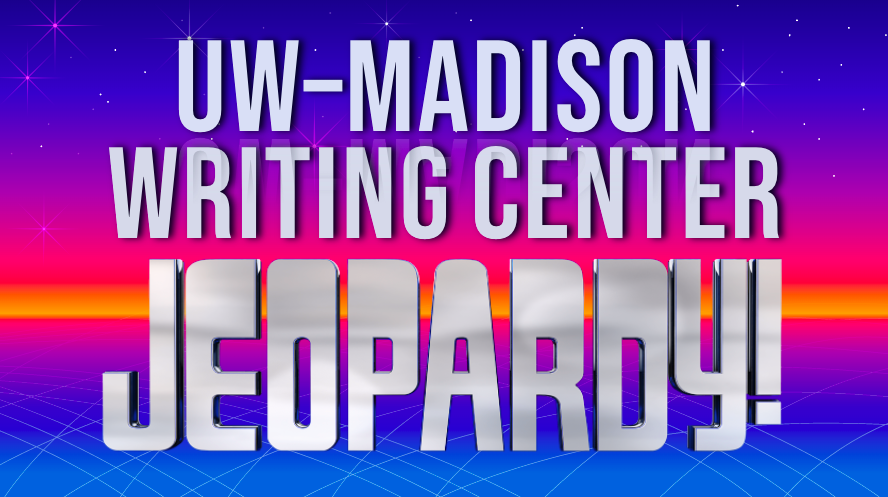
To give a sense of the common topics on the blog, I want to offer a sample of posts—listed in tables below—organized into some of the most common topics over the years. These categories obviously tell us important things about the programs in place at this writing center as well as the interests of the authors and their university context. It’s important to note that some dimensions of the Writing Center programs at Wisconsin are largely invisible in the blog, while others receive outsized attention. There is, for example, a heavy emphasis on graduate-level writing and writers –not surprising given how many authors of posts are graduate students themselves and given that the University of Wisconsin-Madison is always near the top of all US universities in the number of PhDs awarded each year, so there’s no shortage of graduate-level writers at the center. Like all classification systems, this one is admittedly imperfect—topics overlap; some of these posts easily belong in two or three different categories. I’ve deliberately included the publication dates in order to give you, at a glance within these tables, a quick sense of historical depth and of development. (I’ve also got structuralist readings of these posts, but my post is already running overtime, so you’ll have to ask me privately about those.)
No matter how long the sample of posts in the tables that follow, I’m not being hyperbolic when I say that I’m leaving out 100 or 200 more posts that I love and admire. So please, if you’ve written a post and it doesn’t happen to be included here, please know that it’s definitely in the 100 or 200 other posts that I love and admire 😊 . But I thought you might want me to curate a little and invite attention to some posts that deserve new and returning readers.
The posts listed in the tables shine in so many different ways. To give you a sense of that richness within these posts, I’d like to briefly describe just a few. If, for example, you’re planning to lead a writing group or shift to online groups, or looking to do more anti-racist work with writing groups, the specificity and depth of Dorothy Mayne’s and Gabrielle Isabel Kelenyi’s post about writing groups in a hybrid time, from November 2021, is really valuable. And the voices of the writing group participants add a special depth. Hyonbin Choi’s post, from February 2017, offers an inspiring metaphor for describing advanced research writing, which changed how I talk with students about their dissertations. I love how, in an October 2020 post, Emily Bouza, Tim Cavner, and Keli Tucker explain code-switching, code-meshing, and translingualing, which are so often mentioned in writing center practice and at conferences but rarely parsed and explained so clearly. This post illustrates some of the ways graduate students can take what they’ve learned about literacy in a great graduate seminar, which they describe as a profound learning experience for them, and recirculate their knowledge and their experience with new audiences. John Tiedemann’s 2016 post about the University of Denver’s writing centers at shelters for the homeless in Denver is unforgettable. It’s an amazing story of people, homelessness, and human rights, beautifully, powerfully narrated and illustrated with indelible photos that John took himself.
And Erica Kanesaka Kalnay’s post “Orange and Sardines: Art and Ekphrasis in the Writing Center,” from September 2017, shows just how smart and multi-layered posts on this blog can be. It’s simultaneously about a fresh idea for tutoring methods (within a tutorial discussion of drafts, asking writers to describe what they are writing about before pushing prematurely to what can be scary or more difficult conceptual work—asking about analytical or argumentative points); about working with writers from visual majors (artists, engineers. . .); and about an important but rarely discussed genre in tutor education or in writing center literature, the artist’s statement. With explanations of ekphrasis and ideas from Clifford Geertz and multiple images of visual art, including one of Erica’s own paintings, this post does just what Erica says writing center work does: it “involves crossing genres, media, and disciplines.” Wow!
So here’s the long-promised categories and sampler. Even if you just skim the categories and some of the titles, you’ll get a good sense of the blog’s richness and arguments. In case you’re interested, a full chronological archive of all the posts is available on Another Word.
Diversity, Equity, Inclusion, and Justice
Undergraduate Writing Fellows (Course-Embedded Tutors)
| Kim Moreland | Undergraduate Research in Writing: Keeping It Real | 12/3/12 |
| Emily Hall | Showcasing Undergraduate Research | 4/20/15 |
| Rachel Herzl-Betz | Peer Tutoring and the Serious Work of Undergraduate Scholarship | 11/30/15 |
| Annika Konrad, Emily Hall, Laura Strickland, Mike Passint, and Julia Boles | Writing Doesn’t Need to Be a Near-Death Experience [The Rose Pathways Writing Workshop at Chadbourne Residential College] | 4/3/17 |
| Brenna Swift | Undergraduate Research as Transformation: Writing Fellows Build and Share Knowledge | 5/18/20 |
| Faith Kim and Veronica Hayes | Continuing the Discussion: Tutoring and Social Justice in Virtual Spaces | 4/13/21 |
Language Politics and Multilingual Writers
| John Stafford Anderson | Writing Across the Foreignness | 4/26/11 |
| Manuel Herrero-Puertas | Sitting on Top of the World: A Multilingual Writing Center? | 4/28/11 |
| Rachel Carrales | Confronting the Politics of Language Diversity in the Writing Center | 10/27/14 |
| Molly Rentscher and Vicki Kennel | Getting to the Roots of L2 Writer Experiences | 10/8/18 |
| Emily Bouza, Tim Cavner, Keli Tucker | Translingualism: An Alternative to Restrictive Monolingual Ideologies in Writing Instruction | 10/27/20 |
Outreach, WAC, Campus and School Partnerships
Madison Writing Assistance and Community Literacy
| Elisabeth Miller and Nancy Linh Karls | Madison Writing Assistance: Spotlighting Three Writers | 4/14/14 |
| Glenn Hutchinson and Paula Gillespie | Mindsets and Partnerships: University and High-School Writing Centers | 9/7/15 |
| John Tiedemann | Shelter Stories: Homelessness, Human Rights, and Community Writing Centers | 10/24/16 |
| Tim Cavnar | Madison Writing Assistance: Spotlighting Three Writers | 2/3/20 |
Writing Groups, Graduate Writing, and Building Community for Writers
| Elisabeth Miller and Stephanie White | Senior-Thesis Writing Groups: Putting Students in the Driver's Seat | 3/4/13 |
| Chris Earle, Kevin Mullen, Rebecca Couch Steffy, and Nancy Linh Karls | "A Life-Changing Experience": Some Reflections on the Mellon-Wisconsin Dissertation Writing Camp | 2/9/15 |
| Hyonbin Choi | Sharing Your Most Cherished View: A New Metaphor for Dissertation Writing | 2/6/17 |
| Emily L. Loney | Writing with Others: Renaissance Coteries, the Writing Center, and Community | 2/17/20 |
| Mia Alafaireet | What Makes a Writing Group? Undergraduate Writers Model Compassion and Acceptance | 8/3/20 |
| Calley Marotta and Jennifer Conrad | "Focus on the Now," Or Embodiment in a Virtual Dissertation Writing Camps | 11/10/20 |
| Dorothy Mayne and Gabrielle Isabel Kelenyi | Writing in Community: Writing Groups in a Hybrid Time | 11/23/21 |
Technology
| Christopher Syrnyk | Writing Center Websites and Their Discontents | 2/14/12 |
| Mike Shapiro | This Rant Is Asynchronous | 10/22/12 |
| Leah Misemer | Sharing the Space: Collaborating in Sessions with Laptops | 2/10/14 |
| Jennifer Fandel | Conversation Starter: Social Media and the Writing Center | 12/12/18 |
Writing Process and Profiles of Writers
| Mary E. Fiorenza | Acknowledgments & Alignments: Writing from a Center Place | 4/13/16 |
| Chris Earle, Elisabeth Miller, and Bradley Hughes | "Something Magical in Meeting with a Group of Like-Minded People": Graduate Writing Groups in the Writing Center | 4/25/16 |
| Leigh Elion | The Bicameral Writing Mind: Writing Tutors as Writers | 12/6/16 |
| Gabrielle Isabel Kelenyi and Eric Wilcots | When a Dean Writes: Celebrating Black & African American Campus Writers for Black History Month | 2/23/21 |
Tutor Education, Tutorial Methods, Learning within Tutorials, Tutor Recruitment
An Invitation and Some Gratitude
If my time with Another Word tells me anything, it’s that the blog is way too big for a single metaphor. It’s an informal publication opportunity, a stage for a multitude of authors whose ideas and writing I admire so much. Above all, I see this blog is an opportunity and vehicle for learning, for authors as well as readers. I hope it’s not too much of a reach to see the blog as a form of collaborative learning, an ongoing conversation (with admittedly long conversational turns 😊) among knowledgeable peers.
Thank you so much for reading this post! I hope you’ll add a reply, so we can hear your voices and thoughts. What are some of your favorite posts on the blog? If you are one of the blog’s many authors, what did you learn from doing that writing? Do you have a different perspective on the blog? Please share! The very best way to celebrate our shared 300-post milestone is to build a community of learners in the comments.
A huge thanks to some wonderful colleagues and friends. First to the amazing, generous authors whose ideas and hard work and carefully crafted prose are the essence of this blog. To Emily Hall and Nancy Linh Karls and all of the blog team at the UW–Madison Writing Center for inviting me to write this post. To Jenny Conrad for great feedback and suggestions she gave me about a draft and for creating the visual design of this post, including the fabulous collage that’s the featured image for this post. Anything you like about the visual rhetoric and aesthetics of this post, all the credit should go to Jenny. And to Elise Gold for always generous conversations and eagle eyes.
Works Cited
Brown, Stuart A. “The Role of an Editor of an Academic Publication Blog.” Journal of Scholarly Publishing, vol. 52, no. 4, 2021, pp. 199–211. doi: 10.3138/jsp.52.4.01
Emig, Janet. “Writing as a Mode of Learning.” College Composition and Communication, vol. 28, no. 2, 1977, pp. 122–128.
Geller, Anne Ellen, Michele Eodice, Frankie Condon, Meg Carroll, and Elizabeth H. Bouquet. The Everyday Writing Center: A Community of Practice. Utah State UP, 2007.
Mollett, Amy, Cheryl Brumley, Chris Gilson, and Sierra Williams. Communicating Your Research with Social Media: A Practical Guide to Using Blogs, Podcasts, Data Visualisations and Video. SAGE, 2017.
Siemens, George. “Connectivism: A Learning Theory for the Digital Age.” International Journal of Instructional Technology and Distance Learning, vol. 2, no. 1, 2005, pp. 3–10. http://www.itdl.org/Journal/Jan_05/article01.htm

Brad Hughes was the director of the Writing Center at UW–Madison from 1984–2019, director of Writing Across the Curriculum from 1990–2019, and editor of this blog, Another Word, from 2009–2019.
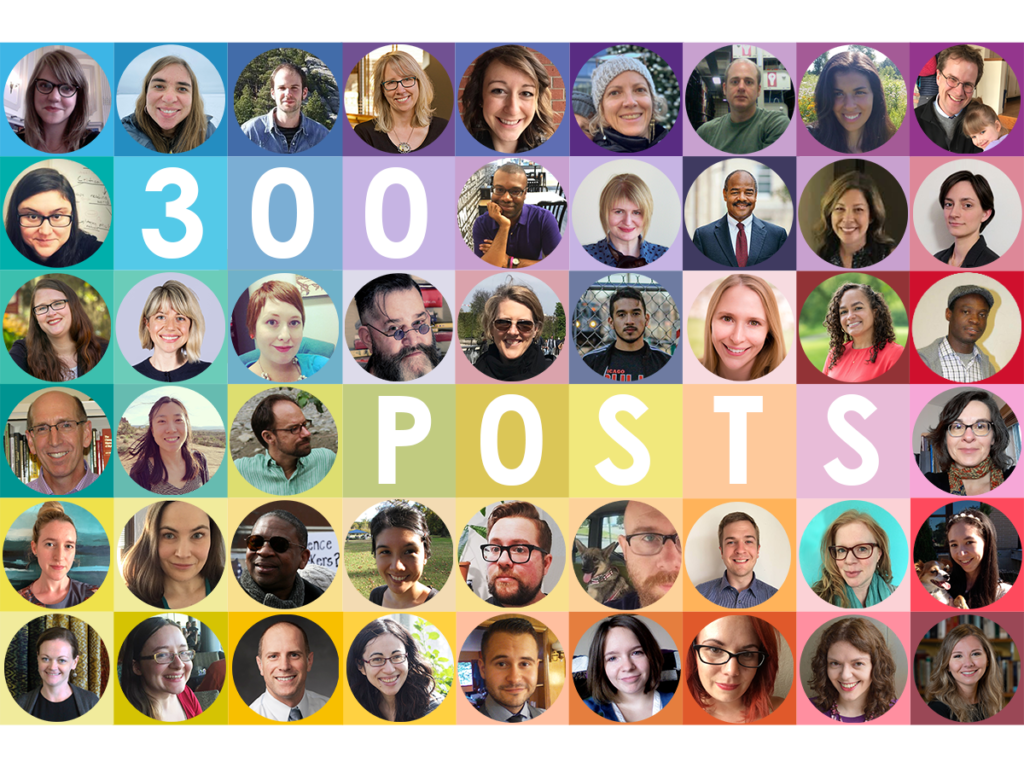


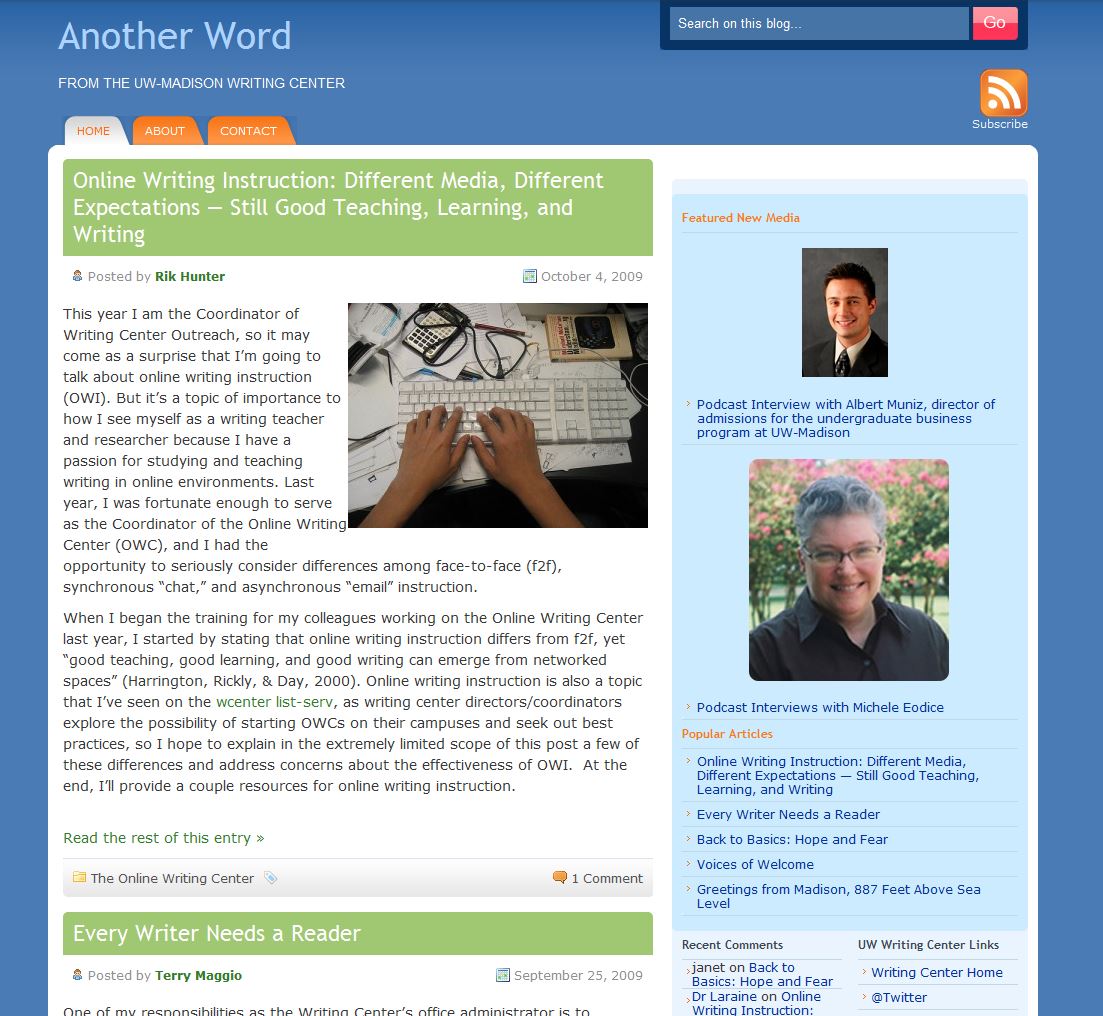
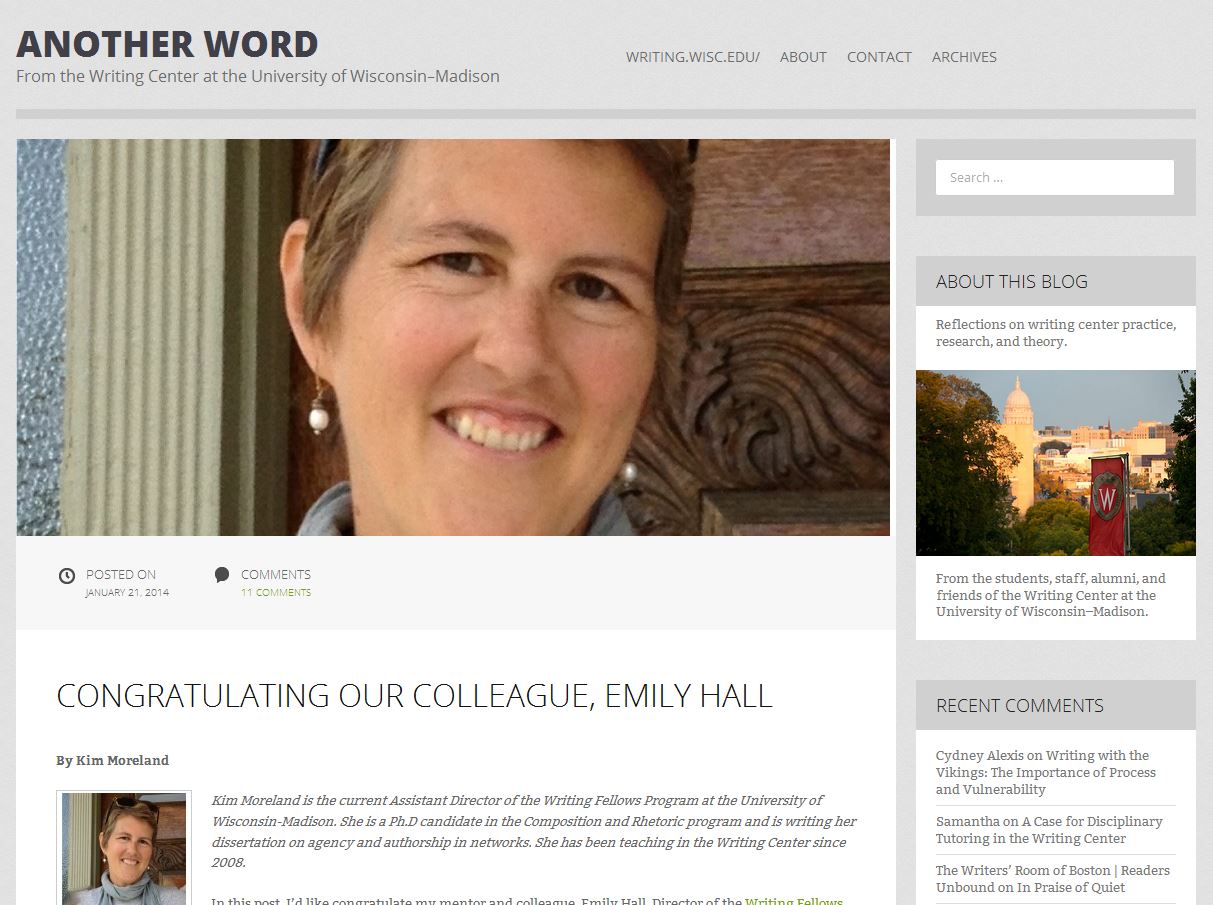
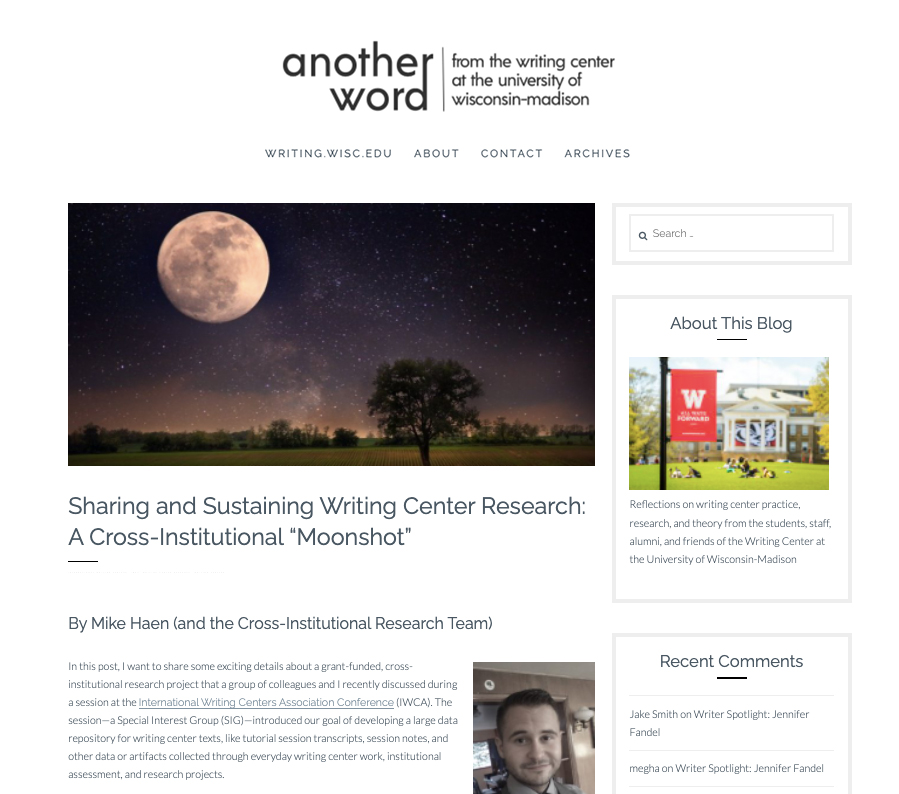





I’m so impressed by your dedication to reading the entire archive of Another Word! It’s really fascinating to see a bird’s eye perspective of the variety of different topics that have been covered over the years — so many great ideas and interesting perspectives have been offered. I really appreciated learning about the how the blog came to be and the evolution of it!
Thanks so much, Brad – for this fascinating post and for the years of loving labor that have gone into Another Word. It’s a singularly valuable living archive of Writing Center teaching and learning and a wonderful resource for us all. Here’s to another 300 posts!
University of Denver
I love the window metaphor! When I was new to working in the center in fall of 2020, I was able to look through those windows to peek into the different “rooms” of the UW-Madison Writing Center programming. I still look into them to better understand different authors, past events and programs, and more. Regularly returning to Another Word has deepened my understanding of our center! Thanks for this reflection on the blog – thinking about the categories of posts you made here is helping me think about what we can do next!
-Dottie
This was such a fantastic and inspiring retrospective! Thanks for highlighting posts that cover a variety of topics and giving some behind-the-scenes information on _Another Word_. I love reading and writing for this blog, and this post is a great orienting resource for the blog’s rich history and purposes as well as what it takes to sustain a Writing Center blog!
Wow. I don’t know how many times I’ve started a reply with that one word. I’m humbled to have had the good fortune to learn from and with all the great people associated with Another Word. It’s such a fine example of equal parts collaboration, collegiality, and composition-minded people. Thanks Brad. Cheers to Another Word!
Oregon Tech University
Thank you for this post! I loved learning about the history of the blog’s creation, particularly from a design standpoint. It’s also really interesting to see 13 years of posts broken out into these categories, especially seeing how posts and discussions on topics like writing in community and multilingualism have morphed over the years. It’s evident that all who’ve worked on Another Word since its inception have been passionate about its mission and audience, which is so great to see!
Incredible and enlightening post, Brad. Writing for Another Word has been one of the many enjoyable aspects of my time at UW’s Writing Center. Thanks to you and colleagues who started it and have sustained it.
I”m looking forward to asking about your structuralist readings of these posts. 🙂
From Brad’s wonderful celebration and thorough analysis of the blog and its 299 posts, I now understand what an excellent resource it would be for my undergrad writing fellows and graduate student tutors–in the same category as WLN, Writing Center Journal, Praxis, and the Dangling Modifier. I will link to it as options for students’ assigned resource reports in both tutor training courses. Wow-the work that it takes to plan and put together a blog like this is comparable to the work it takes to put together an issue of a journal. Impressive!–Carol Severino, Writing Center Director at the U of Iowa
What a wonderful commentary on SUCH a fantastic resource, Brad! As Carol Severino so astutely notes in her comment, Another Word is an absolutely essential Writing Center studies resource. And as you quote me, Brad, I can’t say enough about using this resource in my teaching with undergraduate writing center tutors. It’s my absolute go-to for tutor education materials. What an honor, also, to have written for this outstanding, longstanding resource! And cheers to Brad and to Nancy, Emily, and the UW-Madison WC leadership teams over the years for all of the care they’ve put in to make this resource so valuable for the field of Writing Studies writ large. — Elisabeth Miller, Assistant Professor of English & Director of the Writing & Speaking in the Disciplines Program, University of Nevada, Reno (former UW-Madison WAC Assistant Director)
When I read this post, I almost get teary eyed. Brad has done a great job of showcasing and honoring the various voices that have contributed to this blog. In particular, this blog showcases the one thing I love most about writing: the process. Scrolling through this post, I couldn’t help but to see the people I’ve worked with, the names I’ve seen, and the ideas that have contributed to my own time at the writing center. And the process goes on. Thank you, Brad, for this post! And thank you everyone who has contributed to this blog!
That’s what I was thinking, Chris: all the people this blog represents and that Brad celebrates in this post! I love how the post’s featured image is a collection of so many of those people–some people I know, some people I’ve learned from, some people whose work I’ve read, some people I want to know. That image (and the blog it represents) reminds me of another familiar metaphor–the Burkean parlor filled with folks participating in a lively, multifaceted, ongoing conversation about issues that matter to them, their work, and others.
LeMoyne College
What a wonderful retrospective, Brad, and a fine anthology of some of the great work we have gotten the chance to read! Reading through many of the posts you’ve highlighted—some for the first time, but many for the second or third—I’m reminded of the fine work that emerges when you give smart people room to think through problems and approaches that matter for the community. — Mike A. Shapiro, instructional staff in the Engineering Communication program at the University of Wisconsin–Madison College of Engineering
I enjoyed reading this post about the history Another Word! Reading this historical context makes me appreciate even more my post on diversity statements from 2017 (feels so long ago and not so long ago at the same time!). I want to extend my congrats to the Writing Center Programs on a huge milestone. As Brad wrote, many blogs come and go. The endurance and vitality of Another Word reflects the 52 year history of the UW-Madison Writing Center itself! Seeing photos of campus makes me so nostalgic for the years I lived in Madison! Can I go back in time and be a graduate student at UW-Madison? I suppose my colleagues and students here at the University of Missouri-Kansas City would not appreciate my time travel!
Congrats again!
Cheers,
Antonio Byrd
Virtually everything I know about teaching, I learned in the Writing Center at UW-Madison. My years as a tutor taught me how to listen, to empathize, to ask (rather than tell), and to collaborate with writers as they work at improving their texts. And over the years, I have continued to learn about teaching from the thoughtful and instructive posts in Another Word.
Congratulations, Brad, on the remarkable milestone of 300 posts on Another Word! It’s an incredible accomplishment that speaks to your vision, your dedication, and your resolve. We are better writing teachers and students as a result of your inspiring work.
University of Notre Dame
I second what John D says above! Time and again when I am discussing a writing assignment or responding to student writing — at all levels — the words I’m speaking or typing viscerally take me back to the UW Writing Center. Reading Brad’s post had me looking up old friends to see where they are and what they’re doing. I would add that now in my administrative work, too, I think often about lessons I learned in Madison. Those lessons — about counting and cataloging, revisiting and reflecting — are all on characteristically inspiring display here in Brad’s post. Congratulations, Brad, and to the decades of friends and colleagues who have contributed! It’s been an honor to play a bit role, and I’m looking forward with John T to reading the next 300 posts. Or at least many of them — we can’t all keep up with Brad!
Clemson University
Always a pleasure to read this blog, always a go-to resource, and always a source of pride that I learned so much from working with Brad and everyone at the UW-Madison Writing Center and WAC program. Every day in my work managing peer tutor and undergrad programs at the University of Waterloo Writing & Communication Centre, I draw from this rich and continuously fruitful treasure trove of experiences and perspectives, which the blog showcases and highlights for us.
I so enjoyed reading this detailed and thoughtful retrospective about the history of Another Word. (you can tell that Brad reread the 299 posts with the same generous spirit he always provides) and want to give a huge congrats to Brad and the UW-Madison Writing Center on this great achievement. The extensive work you and the editorial team put into making this blog so collaborative, with so many different voices and perspectives, and creating so many insightful posts was evident even before you gave us a “behind the scenes” look into all that went on to make this blog so successful and award-winning. Like many have commented, I, too, have used this blog frequently for WC staff education here at Oklahoma State and have pulled in relevant posts for many of my writing students and in my classes. And I am so glad this particular post was put on my radar, as I have been meaning to read Dorothy Mayne’s and Gabrielle Isabel Kelenyi’s post about writing groups in a hybrid time!
This blog has been so important in shaping and informing the WC community. Your post makes me think this topic on connectivism theory and blogging for community building could be an interesting Provocations essay for the WCJ.
Thanks Brad, and the UW-Madison WC, for everything!
Oklahoma State University
Thanks so much, Brad, for putting together this retrospective and reminding me of why you’re such a great leader and mentor. Your post brought back a lot of great memories of all the opportunities you gave me to develop and serve our campus and the profession!
University of Tennessee at Chattanooga
This was so much fun to read, Brad! I’ll need to come back and look at more of the articles you’ve mentioned; I already include both Annika Konrad’s “Access as a Lens for Peer Tutoring” and Rachel Azima’s “Rethinking Patience” (which happens to be one of my favorite writing center articles EVER) every year that we offer our seminar for new graduate and professional writing consultants. What a wonderful community of scholars (and designers!) you’ve built!
University of Minnesota Center for Writing
Congrats, kudos, and—most of all—thank YOU, Brad, for giving the gift of this insider history and fascinating blog retrospective to the UW-Madison WC diaspora and the larger writing center studies community! I’m struck by the words of the John Lovas award letter you quote: “Another Word strives to feature a diversity of voices and its authorship is truly collaborative. For many of the authors, writing for Another Word is often their first experience in blogging.” Indeed, that was true for my co-authors Katie Levin, Kristen Nichols-Besel, and me, and I would add that your generous invitations to blog (and the warm embrace of blog readers) gave many of us first timers the courage to pursue our questions further with more research and publication in the field (our post led us to two publications). I suspect we could trace many similar lineages in this amazing collaborative archive of our field’s practice and inquiry. I look forward to reading and learning more with you all!
What an impressive undertaking, and I like all of the interesting discoveries and patterns that emerged from it. As a lover of archives and nostalgia, I definitely see the value of scholars taking this kind of approach more often toward blogs and other digital artifacts. I think many people (well, maybe not very young people) still see the Internet as something oriented toward the present or future, but it has fascinating histories, too, which are worth exploring.
Relatedly (and maybe narcissistically), I was flattered by the paragraph about my post. It caused me to look back at it, and I had actually forgotten most of what I’d written only five years ago, but it strikes me how what I learned from writing it has stuck with me, even if my interests has evolved since then. The same goes for my writing center training in general: although my teaching and research areas are quite different, I still think back often to the lessons I learned from writing center work. So thank you! 🙂
Wow, thanks, Brad for that deep dive into this invaluable contribution to writing center theory, practice, praxis, and fun. I’ve taken the liberty of composing a single title based on one choice from each category plus a few joining words:
[This blog is about] access as a lens for peer tutoring, showcasing undergraduate research, [and] getting to the roots of L2 writer experiences [while] introducing the WAC Program’s online writing toolkit [and] spotlighting three writers [for] senior-thesis writing groups [and] writing center websites and their discontents when a dean writes [about] three awesome things to do when training peer tutors.
Perfectly coherent, right/write?
Really, I appreciate so much the work of the UW Madison Writing Center and have for a very long time. Just seeing the list of authors and contributors is a stroll down memory lane and a veritable who’s who of writing centers/writing studies. I thank you all.
Neal Lerner, currently finding myself in the position of English Department Chair at Northeastern University (and very much missing day-t0-day involvement in writing center work)
This is such a wonderful post, Brad! Just being able to hear about the history of the blog is fascinating, but seeing so many familiar names fills me with nostalgia for the rich, vibrant community that was at the center of my experience working at the Writing Center and that I continue to miss. Another Word is my go-to for directing our Writing Center Undergraduate Tutors to current perspectives in WC studies. Every year they mine Another Word for approaches to their research topics and for guidance in where to look for additional scholarship. I am so grateful to everyone who has contributed to making this blog such an incredible resource. I continue to be inspired by it in a multitude of ways!
The Catholic University of America, Washington, DC
Reading this post reminds me how incredibly fortunate I am to work with such smart, thoughtful, deeply engaged colleagues. Wow! There is so much history and so much important scholarship embedded in the entries. I really appreciate, Brad, how you have theorized our blog in ways that will help us sustain it for the future. Thank you so much for this wonderful post!
– Emily
I feel so lucky to have my words in such good company! The comprehensiveness of this post is very you, Brad 🙂 What an amazing resource this blog is. It truly showcases how the medium can provide a home for excellent scholarly conversation. And the photos and so many of the names fill me with great nostalgia. I agree that John Tiedemann’s post is unforgettable, and I can’t even count how many times I’ve referred to Mike Shapiro’s “This Rant is Asynchronous”! Thank you for this!
University of Nebraska-Lincoln
As ever, Brad, you manage the marvelous: to appreciate the best in the medium, wrangle multiple perspectives (history, theory, Jeopardy), give voice to friends and colleagues, and list yourself last among leaders. You would be missed if you weren’t everywhere.
I had no idea when I was careening around campus in the late ’60’s that student life at UW could have been any more blissful than it was, but there wasn’t a Writing Center yet. Boy–what I (just) missed! And how lucky I was to find it after all in New York, to spend the better–much better–part of a life in its labors, and to make such good friends in the effort. I blush that I got to post on Another Word with such eminent figures in the field, the stellar staff(s) of the U’s Writing Center.
Hunter College, CUNY
Thank you so much, Brad, for this thought-provoking retrospective! I find it particularly inspiring that Another Word has explored issues of linguistic justice and diversity, equity, and inclusion so frequently and meaningfully over its lifespan. Like Elisabeth Miller, Emily Hall and many others who have posted in the comments, I find Another Word an incredibly valuable resource for tutor education. The post by John Tiedemann that Brad mentioned and Brad’s own “Writing Center Moonshots” are featured in our unit on Writing Centers and Social Justice where we quote from Brad to ask: What is your moonshot? In other words, what is your “ambitious goal” for improving your tutoring? “How do you want to stretch? How do you want to contribute?” .
SUNY Old Westbury
What a wonderful celebration of this blog and all the voices that have made it so impactful for over a decade. One of my favorite things about Another Word has always been the chance to get a glimpse not only at UW-Madison’s Writing Center, or even the MWA locations across Madison, but of centers in Notre Dame, Germany, and so many more. Talk about networks!
-Chris Earle, Assistant Professor at the University of Nevada, Reno
One of Brad’s metaphors reminds me of my first MRI July 2018. I’d heard an MRI was hard to endure because of claustrophobia and banging. The MRI technician asked what kind of music I wanted to hear, I said “funk,” and she made that selection on Pandora. The first song was “Fantastic Voyage” by Lakeside. Then the banging started. But something delightful happened, fantastic even: the MRI’s noise and the song’s rhythm became in sync. I wasn’t hearing banging, and I didn’t feel claustrophobic; instead, I was in a deep harmonious groove, and I knew everything was going to be alright. It was like I was in a boat on a voyage across Lake Mendota. The Another Word blog does that for me, too, the way it brings together people and their ideas, finding harmony among elements that might under other circumstances seem cacophonous. You’re right, Brad. Another Word is like an MRI. Thank you for all the hard work that has sustained the groove. And thank you to the UW-Madison Writing Center for performing a state-of-the-art example.
Jon Olson, Associate Professor of Writing Emeritus, Penn State University
Thank you, Brad, for writing this terrific 300th blog post (I’m impressed—but not surprised—by your stamina in reading the previous 299). Reading your essay was a wonderful nostalgia trip, and I loved revisiting all the productive learning and research that went on in the WC, from the vast and rich array of tutor-education to the ever-evolving graduate writing groups. Another Word expressed to the outside world the collaborate, supportive, and dynamic teaching environment that thrived at the WC. Working with so many dedicated colleagues over the years was a real gift, and I’ve learned so much from both reading and writing WC blogs! Oh…and I’ll be in touch soon about the worst names you considered for the blog…
This post is magnificent. Every Friday morning, I have a standing appointment on my calendar called “Reading.” This is a reminder for me to (try to!) keep up with all of the fantastic writing going on in our field. I almost ALWAYS end up reading at least one piece from Another Word and following a fascinating trail of thinking and scholarship suggested by an amazingly thoughtful writer.. Another Word is also my first stop when I find myself wondering about a question of pedagogy in the Writing Center. Another Word is simply filled with smart and thorough thinking.
I’m grateful to you, Brad, for drawing together so many threads in this post–and for drawing so many of us together as readers and writers. Congratulations to all on 300 posts! And one million thanks to you, Brad, for making it happen.
University of Notre Dame
Holy cats! I’m embarrassed to admit that I forgot what a wealth of riches this blog represents. In my defense, I’ll note that I foolishly wandered away from Writing Center World for a while. I’ve returned now, though. So thanks so much for bringing me back to this work. Somewhere in the next 129 days, I’ll move out of my Interim Chair gig and as part of my celebration, I’ll be digging in here to enrich our tutor preparation course.
BTW, while I did not read all the entries here, as Brad did, I did look back at my own comments (surprising no one who knows me, I’m sure). I’d like to end here as I did in those before times:
Brad is the man.
Melissa Ianetta, Executive Director of the Communication Center (and assorted others things), Georgia Tech
As someone who researches online communities and who frequently does what I lovingly refer to as “spreadsheet scholarship,” recording and classifying periodical entries and their comments, I appreciate the amount of time and effort that went into this post, Brad. From the first image all the way through the comments, this post celebrates the online community and collaboration of this blog. I also got a little teary eyed and nostalgic, Chris C, seeing all the far flung places the folks I’ve known have landed.
As Rachel A. mentions above, I have found myself referring to Michael Shapiro’s post and the idea of thinking about what online instruction provides that in person instruction does not (instead of the other way around) throughout my teaching career, but particularly while teaching during the pandemic. That idea in fact became the guiding principle of a course I taught this past fall, where I centered the online space even in our in person interactions in my attempts to be flexible as numbers spiked. Neil Simpkins’s posts about pronouns in the Writing Center have also stuck with me as I have traveled to new administrative contexts; his post helped me see that something as seemingly small as an intake form could be so important for welcoming all students. Though I have moved away from writing centers, I still use the lessons I learned in writing centers about asking questions, assessing outcomes, and building relationships on a daily basis.
Leah Misemer, Assistant Director of the Vertically Integrated Projects (VIP) Program at the Georgia Institute of Technology
This post is a fantastic representation of the meticulousness of Brad’s work. His voice is still in the back of my mind every time I make a decision for our writing program. When my class went through UW in the second half of the aughts, many of us were drinking the blogging kool aid. And almost every blog we read to familiarize ourselves with the field is now covered in digital cobwebs. And here is the UW writing center blog, chugging along 300 posts and 13 years later. It’s remarkable.
Lafayette College
Loved this post and the blog: both attest to the enduring, transformative power of collaboration–and of Brad’s vision, mentoring, dedication, and superhuman work ethic. Ditto Rik’s and Rachel Azima’s comments on the good memories stirred by this post and the honor of being included in such good, good company. And ditto all the congrats and thanks to all involved in Another Word.
Here’s to another 300 words, posts, people, connections, collaborations, celebrating, learning.
Brigham Young University
This is a magnificent retrospective, Brad, which leaves me with a whole new appreciation for the work that has gone into this blog over the years—and some questions about whether your writing style is the inspiration for my own M-dash tendency. Thank you for sharing your insights!
University of Southern Mississippi
I can’t say enough about this retrospective, not to mention the murderer’s row of commenters. I particularly appreciate your willingness to not just mention, but directly discuss the work it took to keep people writing, editing, and commenting every single month. It isn’t necessarily sexy to talk about “twisting authors’ arms to twist their friends’ arms to add comments,” but it’s that kind of candor– and practical diligence– that makes your mentorship so valuable. Thanks for the tour.
Writing Center Director, Nevada State College
Nice work on this post Brad and shout out to Rik for the foundational work on setting up and choosing WordPress and all! I did not know that fact.
Such a dope array of topics and authors and perspectives and I agree with Emily and others that Another Word has been so useful when teaching or doing my own writing/presenting.
Congrats to everyone who makes Another Word on the milestones! Only bummer for me about this whole connecting writing via backend database thing is that we had to name it “blog” 🤢
DePaul University
This is so impressive! I absolutely agree with you about this blog sharing an “incredible amount of wisdom” and often recommend tutors to read it. Your post made me think back to your workshop about blogging in 2011. As participant I learned not only a lot about the rhetoric of blogging, but also about the importance of keeping a blog alive. “Another word” is the best example ever for a really vivid blog, full of valuable knowledge. Thank you very much for this.
European University Viadrina, Frankfurt (Oder), Germany
SRH Berlin School of Popular Arts
This was an inspiring walk down memory lane, Brad, and I’m grateful to you for highlighting the blog’s significance over the years. The blog has served as a valued resource, a fun and creative short-term writing project for graduate students, and a history of the field! I have to confess that I’m most taken with the fact that researchers in writing and rhetoric have at our disposal 300 blog posts that reflect thirteen years of thinking, questioning, and wondering about the relationship between writers and readers. I’m honored to have been a part of it, and I’m just a bit sad that I didn’t think to write a dissertation charting the history of the field as reflected in the blog. I hope someone does it!
Madison College
What a wonderful reminder of the wealth of ideas and perspectives that this blog offers so generously to its readers. Thank you, Brad, for your leadership in cultivating structured and intentional opportunities, like this blog, for graduate students in particular to step into Writing Center discourse and make a contribution within a supportive community of voices. I am eager to read more!
Cabrini University
BRAD! What a nice trip down memory lane. I don’t think there’s another Writing Center blog that can hold a candle to what y’all have done through the years at UW-Madison. Kudos.
Ball State University
It has been such a delight to read this post and so many of the articles linked in it this week. Like Elisabeth and many of the commenters have noted, pieces from this blog have become some of my favorites to assign in my tutor education course – in fact, my students had better prepare for a calendar switch-up for the last few weeks of the semester, now that I’ve been reminded of so many other great pieces. I especially appreciate your point, Brad, about the blog as a site of learning not just for its readers but also its authors. I’m struck not only by the wealth of content here, but also how this blog has served in some ways as a kind of scholarship test lab, where writers get to enact some of our values and commitments in ways not always otherwise afforded by academic publishing. Co-authorship is not only the norm but possibly the default here, and co-authorship with students, tutors, junior scholars, and staff is front and center. And, so many authors seem to be experimenting with style, voice, mode, and unexpected links between their varied domains of knowledge. I mean, who else would have let me write about tutor expertise in connection with [checks notes] Westworld??
Like Chris C., Matthew F., and some others have also confessed, I, too, got a bit emotional reading this post. So many of us got into writing center work because we love working with others, and it’s been such a joy to see so many of those “others” named here (I’ll never put it better than Rachel H-B: Murderer’s Row!!). Especially during a pandemic where many of us have felt isolated from our home or professional communities, the visual is a powerful reminder that the community has been here all along.
I’m not at all surprised, Brad, that you took the time to re-read every last post; you’ve always cared so deeply about each and every one of us, and your engagement with our work is an act of that care. If anything is surprising, it’s that you had to re-read them at all – you didn’t have them committed to memory?? I tease, of course, but the joke will be on me when Mayim and Ken finally come calling…
Writing Center Director & Assistant Teaching Professor, Oxford College of Emory University
Brad, Thank you for providing so many points of access for people new and old to the blog to sort through its many topics and ideas. To me, this blog’s meaning stems from its public nature. I know I am not alone in saying that, of all the writing I do, it is these blog posts that reach people. And that means everything. Thank you to all the founders, writers, collaborators, and participants who have made this digital space a sustainable way to think and grow through writing.
Calley, Assistant Professor of Literacies and Composition, Utah Valley University
Wow, what a journey! Thank you for this careful and curated tour through the blog’s 300 posts. It’s wonderful to see them highlighted and categorized here.
And speaking of tour….Brad claims “Another Word does not catalogue anyone’s exotic travels,” but I disagree. In fact, the blog, this post, and these comments *do* catalogue the exotic travels of the UW-Madison diaspora: Utah, Georgia, Tennessee, Michigan, Minnesota, Pennsylvania….are there any states or any university Writing Center or Composition program that Another Word hasn’t touched in some way?? It’s a pleasure to be in such virtual community. So I do agree with Brad that “this collaborative blog does what Anne Geller, Michele Eodice, Frankie Condon, Meg Carroll, and Elizabeth Bouquet, in their groundbreaking Everyday Writing Center: A Community of Practice, urge writing centers to do—to intentionally cultivate a ‘dynamic learning and writing culture and community’ (14).”
University of Pittsburgh
What a wonderful retrospective . . . seeing so many familiar names and reflecting on the good work of the Writing Center made me a bit nostalgic for the time I was lucky enough to spend there! That’s actually one reason I enjoy the blog so much: it provides me with a real sense of connectedness to this remarkable community. Perhaps that’s one reason for Another Word’s impressive longevity? It’s certainly why I know I was not the only one who upon reaching the second paragraph of this post declared “well of course Brad reread all 299 posts and 2000+ comments.”
Thank you for building and celebrating this community, Brad. Here’s to Another Word and another 300 posts!
Kennesaw State University
Reading this post makes me miss the Writing Center at UW-Madison so much! I enjoyed writing posts and I hope to do so again from a new perspective in the future :). Also, I really appreciate the categorization work here! Often I like to include a post as a reading in my writing classrooms and this helps me see the wide range of topics this blog has covered!
University of Washington Bothell
So many issues to comment on concerning Brad’s post. First, I couldn’t help but smile at Brad’s description of the process he went through to write it – and I actually laughed when I read “In typically compulsive-Brad fashion…” He undertook an extraordinary amount of work to read all 299 previous posts, and the result, as it always is with Brad, is extraordinary.
Reading about the many topics that have been addressed in this Another Word, how it has attracted readers from literally all over the world, the many purposes for which various posts have been used, and the distinguished academics who have written and/or commented on posts…simply breathtaking.
Brad invokes many metaphors to try to capture and fully appreciate the history of this blog and what it has meant over time. Allow me to offer a metaphor of my own to try to capture how much I valued my time at UW-Madison’s Writing Center and having had the honor to be mentored by Brad. For me, when I think about my time with Brad in Madison, I think of ripples of water. I think about all of us who were mentored by Brad and what we learned both from him and from others. John Duffy observed in his comment, “Virtually everything I know about teaching, I learned in the Writing Center at UW-Madison.” I couldn’t agree more and I know countless others would agree as well. And when we left Madison, we rippled out to institutions all over the country to train a new generation of writing tutors, and the ripples continued to spread. It’s affirming and inspiring indeed to think about the countless students who have benefited from the ripple effect of Brad Hughes and UW’s Writing Center – and what a distinct honor to be one of those very small ripples! Thank you, Brad, for this post and for, well, everything.
Suffolk University
Ah! Brad, I took my time to read this post and indulge myself in some mixed feelings of the sheer pleasure of reading your enthusiastic voice, my deep gratitude to your work and its influence on me, my amazement at UW-Madison Writing Center, nostalgia for the inspirational moments earlier that led to my WC career, a rekindled aspiration for what I might or could still do as a writing center director and, alas, some realistic reflection of my own institutional context that would only confuse me.
I especially appreciate the aerial view that offers a perspective for me to zoom in on some topics without losing sight of the relational significances of my own experiences. That picture of Lake Mendota and UW-Madison campus was a magical cue for me to remember the summer of 2008 and some private memories. From that aerial, I saw myself wearing my Spartans hoodie and strolling down the lakeshore path every morning from a student dormitory to attend the summer institute. It was dreamy and is still surreal to remember! An interesting fact that most American people at UW-Madison don’t know about Lake Mendota is that Chinese and Taiwanese international students at UW-Madison would call it “Lake Dream-of-it” because Mendota sounds exactly like “dream of it/him/her” in Mandarin (夢到它 Mèng dào tā ; literally word-for-word “dream of it”). But honestly, I haven’t dreamed of it since 2008… because I guess I’ve been living the dream! Thank you, Brad, for all that and more!
Scott Chiu, Writing Center Director at California Lutheran University
I agree, Tim L. (from above), it is remarkable–the blog, the UW-Madison Writing Center, Brad’s work there. This 300th post exemplifies the scholarly lessons I learned then that still inform me now: take yourself and your work seriously; do what you say you’re going to do; do the work all the way; remember everyone’s names and also their family members and pets (this one I fail at). Thank you, Brad, for modeling this all once again. I’m so grateful to have been part it.
Director Writing Programs, University of Massachusetts Amherst
Thanks so much, Brad, for your impressive and engaging retrospective. Another Word’s sphere of influence has been (deservedly) far and wide–more evidence of your teaching, mentoring, and ‘including’ genius. Reading your post and the others, and especially the UW photos, further prompts good memories and sincere gratitude for years of your Madison area colloquia–how great it was to regularly gather with you (+ brownies), your Madison staff and so many wonderful colleagues.
Here’s to hundreds more posts!
Director, The Writing Center, The University of Wisconsin-Milwaukee